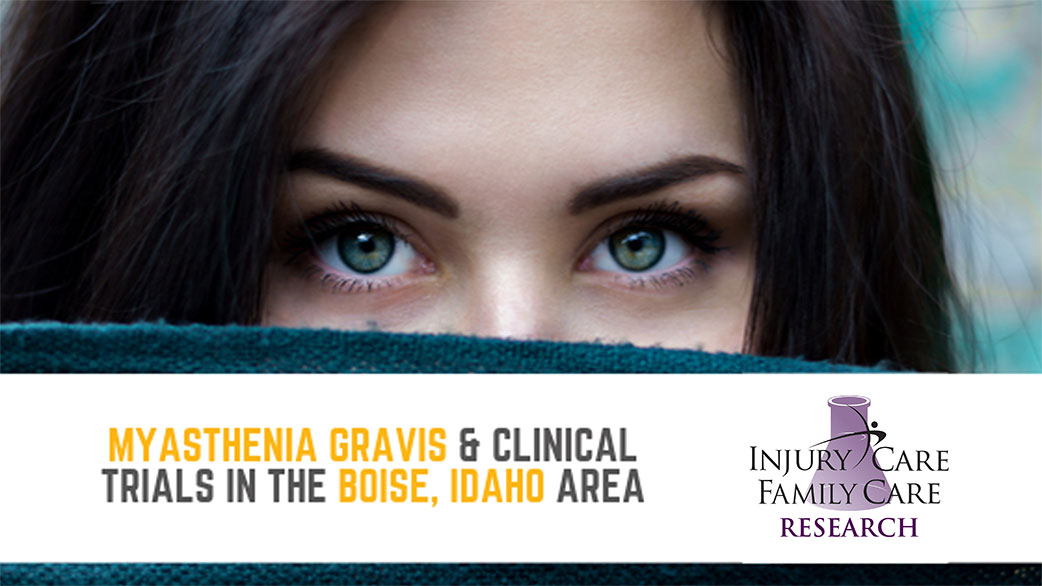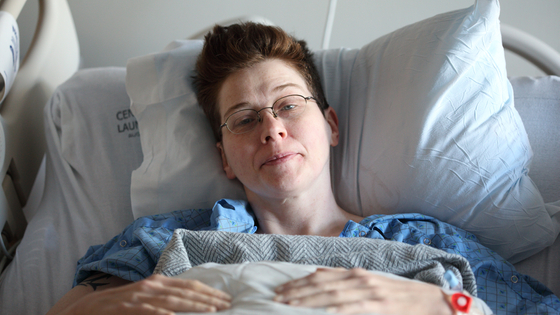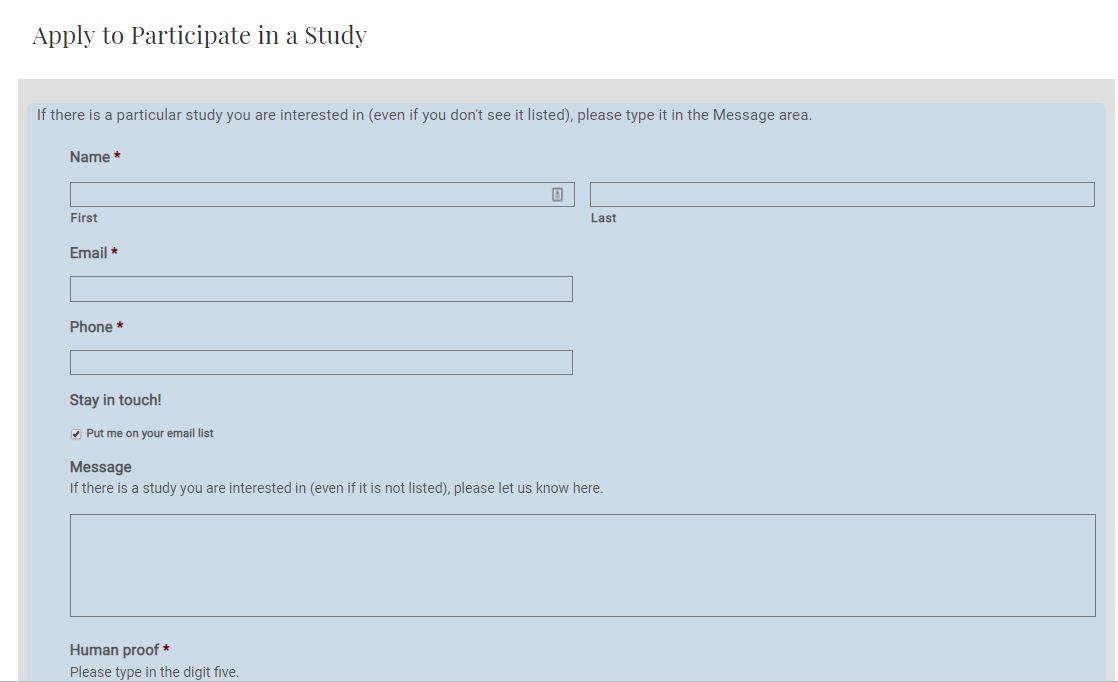Myasthenia Gravis Treatment? We Are Too- With Clinical Trials in Boise, ID!

Family Care Research is enrolling now for a myasthenia gravis (MG) clinical trial in Boise, Idaho. Myasthenia gravis is an autoimmune disease that causes weakness in voluntary muscles (muscles that are usually controlled at will). The muscles responsible for eye movements, blinking, swallowing, and facial movements are often involved.
If you’ve recently received a myasthenia gravis diagnosis, check out this blog article to educate yourself on the basics of both the disease and clinical research. Next, call our office or apply online to see if you may qualify to participate in the study.
What Does “Autoimmune” Mean?
You have probably heard of your immune system before.
It is your body’s natural defense system against germs. When the immune system is functioning properly, it senses bacteria & viruses and flags them as “foreign” to the body. Then, it sends proteins called antibodies to destroy them.
A healthy immune system can tell the difference between cells that should be destroyed (like bacteria) and cells that actually belong in the body. In autoimmune diseases, you could say that the immune system gets “mixed up” or “overacts”. It mistakes part of the body as not belonging, and attacks it with proteins called autoantibodies.
NOTE: One example of this that you may be familiar with is rheumatoid arthritis (RA), in which the immune system attacks cells in the joints, leading to redness, pain, and stiffness.
Myasthenia gravis is considered an autoimmune disease. Its symptoms are typically caused by the immune system attacking the tissues that give nerve signals to your muscles.
What Are Some Potential Myasthenia Gravis Causes?
We aren’t sure yet what causes myasthenia gravis in every circumstance. We do have some good guesses, though:
- The thymus gland: 10-15% of patients with MG have a thymoma (tumor on the thymus gland).
- Genetics: Myasthenia gravis is not hereditary, but researchers believe that people with certain genetic traits might be more vulnerable to the disease.
So, What Are Myasthenia Gravis Symptoms Like?
The first important thing to note about myasthenia gravis symptoms is that they are not constant or always present.
Patients with MG alternate between flare-ups (worsening symptoms) and remissions (lessening or absent symptoms). Between flare-ups, the myasthenia gravis symptoms may fluctuate between severe and mild. Different muscles may be affected during different flare-ups. These inconsistencies are one of the main characteristics that help doctors tell MG and similar conditions apart.
For some patients, remission can last for years or for the rest of their lives. For others, remissions are much shorter.
or some patients, remission can last for years or for the rest of their lives. For others, remissions are much shorter.

Some of the most common myasthenia gravis symptoms include:
- Weakness in the muscles that control the face neck, eyes, and/or limbs.
- Partial paralysis of eye muscles
- Double vision
- Droopy eyelids
- Weakness/fatigue in the neck & jaws
- Problems chewing
- Slurred speech
- Difficulty swallowing
- Difficulty holding head upright
Overuse of muscles seems to trigger or worsen symptoms.
Myasthenia Gravis Prevalence: How Many People Have It?
Myasthenia gravis affects about 20 per 100,000 people worldwide. It is more common in women who are younger than 40 and men who are older than 60.
Common Types of Myasthenia Gravis Treatment
There is currently no cure for myasthenia gravis. The goal of MG treatment is to improve muscle function and to prevent potentially deadly complications related to breathing and eating.
Doctors often recommend a combination of the following myasthenia gravis treatments:
- Medications that reduce the immune system’s response, steroids, or medications that directly affect how chemicals in the body interact with muscles and nerves.
- Removing the thymus gland (thymectomy). While researchers aren’t sure what role the thymus gland plays in MG, people who have it removed tend to need less medicine and have fewer complications from the disease.
- Plasmapheresis, which removes abnormal “autoantibodies” from the blood and replaces them with normal ones.
- Immunoglobulin, which is a blood product that can help decrease the immune system’s attacks on the body’s nerves and muscles.
Family Care Research is currently enrolling a Myasthenia Gravis Clinical Trial in Boise, Idaho.
Know Your Rights As A Patient.
Your rights as a patient and study participant matter to us! It is crucial that you understand them, as well as the basics of the medical research process.
We’ve done our best to make it easy for you to learn both with this quick, interactive quiz and blog post: Facts Vs. Myths in Clinical Research. If you have any questions, though, don’t be afraid to reach out.
Our approachable recruitment specialists are waiting to respond to your concerns, and clear up any lingering questions you might have about clinical research.

Other Eligibility Criteria
Whether you choose to participate in medical research at Family Care Research or somewhere else, all clinical trial participants must fit certain medical requirements to enroll in a myasthenia gravis clinical trial.
These requirements are called “eligibility criteria”. They exist not to keep people from enrolling, but to make sure that the people who are enrolled in the study will be safe and benefit the most from the treatment being tested. Eligibility criteria also help researchers to ensure that the study’s results are clear and can be expanded on with future studies.
Don’t let worries that you might not fit the criteria keep you from signing up for a study!
That’s what our knowledgeable recruitment specialists are here for. They are trained to examine your health history, and ask you detailed questions to determine whether a study may be beneficial to you.
Some questions you may expect to answer when considering a myasthenia gravis clinical trial include:
- What kinds of MG treatments have you tried before?
- What is your age, race, and gender? (Some studies are designed to examine how a new treatment works in a very specific population.)
- How often do you experience myasthenia gravis flare-ups? Which muscles are most often affected?
- Do you have other health conditions besides myasthenia gravis that may influence the results of the study?
- Are you able to attend regular follow up visits at our clinic in Boise, Idaho?
How to Apply To See if you Qualify for A Clinical Research Trial.
Before beginning the application process, we invite you to read the short text on the Study Participants page of our website, which includes a short FAQ. It also provides an up-to-date list of our current studies, as well as a link to the online application.
Hint: It looks like this:
Once you hit “submit”, your application gets securely sent to one of our recruitment specialists for review. He or she will then reach out to you to answer any last-minute questions, and serve as your guide for the rest of the enrollment process.
If you prefer, you may also call us directly at 208-621-2503 to learn more about participating in a Boise, Idaho Myasthenia Gravis Clinical Trial.
Family Care Research very much appreciates your interest in our clinical trials. We know that together, we can fight for a brighter future for patients with myasthenia gravis all over the world.

